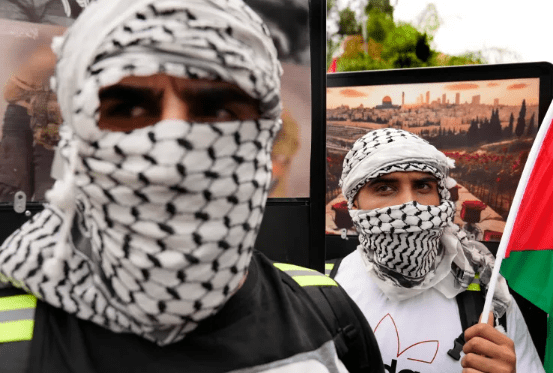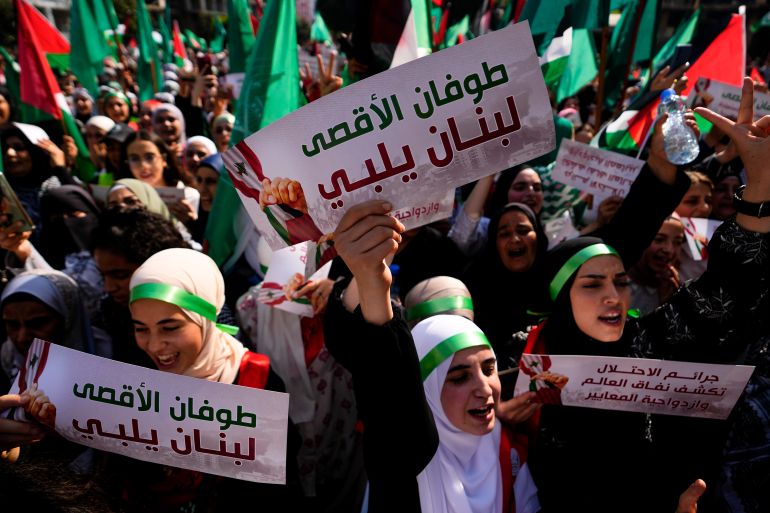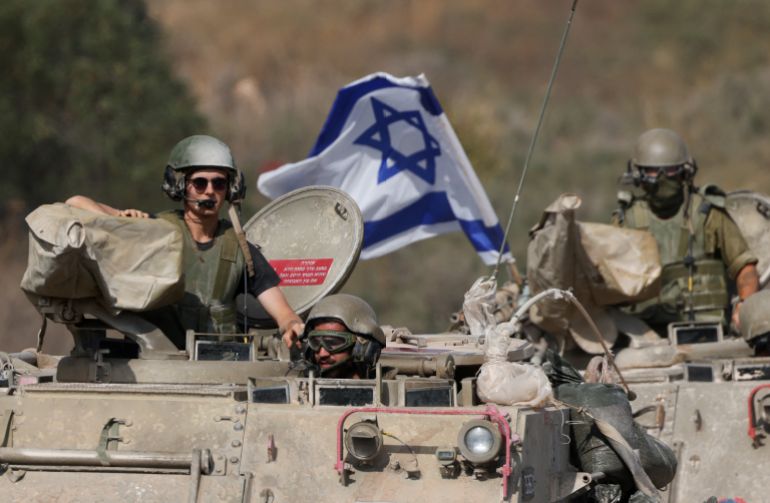
Beirut, Lebanon – Hundreds of protesters chanted and waved flags outside the French embassy in Beirut on Tuesday, denouncing Western support for the Israeli military’s ongoing bombardment of Gaza.
“How are foreign governments with Israel?” said Hassan Badr, 60, who lives in the Palestinian refugee camp Burj el-Barajneh in Beirut. “They are killing kids in front of the world. They should be supporting the Palestinians, not Israel.”
More than 8,000 Palestinians have been killed in Gaza since October 7, amid a bombing campaign that United Nations experts said resulted in crimes against humanity.
In the Arab world, news outlets and social media have carried gruesome images of the death and destruction, including photos of dead children. The nongovernmental organisation Save the Children has estimated 3,324 have been killed since the bombing began.
Tuesday’s crowd, significantly smaller than a similar protest on Sunday in Beirut’s downtown, included Palestinian and Lebanese demonstrators who expressed frustration over the international community’s support for Israel.
“The French people are with the people of Palestine and protesting with us,” said Youssef, a member of the Palestinian group Islamic Jihad who asked to be referred to by his first name only. “But the French president is 100 percent with Israel.”
Many of the protesters carried flags of Lebanese or Palestinian parties and factions, even if some said they were not aligned with a particular ideology.
“We are here to raise our voices to the rest of the world,” Samar al-Ashi, 36, told Al Jazeera. “All the people are with us.”

The protest is only the latest to erupt in Lebanon, which has seen demonstrations in most major cities as well as outside the United States and German embassies.
One of the rallying cries is for Israel to announce a ceasefire. But on Monday, Israeli Prime Minister Benjamin Netanyahu rejected international pressure to suspend hostilities, despite the growing civilian death toll in Gaza.
“This is a time for war,” he said in a televised address.
Meanwhile, in south Lebanon, fighting continued along the border region, as Israel exchanged fire with the Lebanese armed group Hezbollah, as well as Palestinian groups based in the area.
Israeli air raids hit a house in the southern village of Alma Shaab on Monday, according to Lebanese daily L’Orient Today. And Hezbollah announced the death of one of its fighters, its 49th casualty since October 7.
Hezbollah leader Hassan Nasrallah is set to give a televised speech on Friday, his first address since hostilities began. On October 25, Hezbollah released a handwritten letter signed by Nasrallah, calling for any members killed in the conflict to be called “martyrs on the path to Jerusalem”.

Many in Lebanon are hoping the conflict does not expand beyond the southern border region. Lebanese caretaker Prime Minister Najib Mikati told Sky News Arabia on Monday that he was demanding an end to “Israeli provocations” that might spiral into a regional war.
“The Lebanese people do not want war,” Mikati said. He did, however, add that he has “coordinated with international organisations to put in place an [emergency] plan in case war breaks out”.
The last time hostilities between Israel and Hezbollah exploded into a wider confrontation was in 2006.
One Lebanese minister, speaking anonymously, told Al Jazeera that the 2006 conflict resulted in a grassroots movement to aid those displaced by the fighting. He predicted, however, that no such assistance would be offered this time around.
Lebanon has been in an economic crisis since 2019, he explained, and that means most residents are unable to offer refuge or aid as they had in 2006.
Back at the French embassy, many protesters called for greater international solidarity with the Palestinian cause.
Abu Mohammad, a resident of Beirut, said he came to the embassy to support the Palestinian people and oppose Israel’s killing of Gazan children.
“I’m not Palestinian, but I live among them and I know how they feel and what they think,” he said. “Their future is there [in Gaza]. I hope they can go back to their homes. Many of them still have the keys in their hands.”
The protesters hoped that, by standing outside the French embassy, their voices would reach the country’s President Emmanuel Macron.
Last Thursday, France voted in favour of a humanitarian truce at the UN General Assembly, despite voting against a failed Russia-backed ceasefire proposal at the UN Security Council two weeks ago.
It did, however, vote in favour of Security Council resolutions proposed by the United States and Brazil, calling for a “humanitarian pause”. Those resolutions likewise failed to pass.
Macron visited Israel last week and proposed building a coalition to fight Hamas. He has also reiterated his government’s call for “a humanitarian truce to protect the people of Gaza”.
But protesters like Badr, the 60-year-old from the Burj el-Barajneh refugee camp, still hoped Macron might take a stronger stance towards the protection of Palestinian rights.
“I’m with the French [people] and the French resistance,” Badr said, recalling the French underground movement that opposed the Nazis and the Vichy government in World War II. “And Macron, he should be with us, too!”






